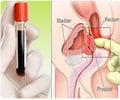A new study reveals that men who skip prostate cancer screenings face a significantly higher risk of dying from the disease, emphasizing the need for improved participation in screening programs.
- Men who skip prostate cancer screenings have a 45% higher risk of dying from the disease
- Screening can reduce the risk of death by 20%, with non-attenders facing a 39% higher risk
- Understanding why men avoid screenings is crucial for improving participation and outcomes
EAU25 Press Release: Worse outcomes for men who avoid prostate cancer screening
Go to source). This finding comes from an analysis of data collected from seven countries as part of the European Randomized Study of Screening for Prostate Cancer (ERSPC), the world’s largest prostate cancer screening study. The results are being presented this weekend at the European Association of Urology (EAU) Congress in Madrid.
A man is diagnosed with prostate cancer every 2 minutes. 1 in 8 men will be diagnosed with prostate cancer during his lifetime. #medindia #cancer #prostate’
Rising Prevalence of Prostate Cancer in Men
Prostate cancer is the most common form of cancer in men in 112 countries, with prevalence expected to double by 2040. If introduced on a national scale, prostate cancer screening programmes that measure levels of prostate-specific antigen (PSA) in the blood have the potential to give men earlier access to treatment, a better chance of being cured. They can also prevent costly treatment associated with advanced prostate cancer.Long-term follow-up data from the ERSPC consistently report that PSA screening programmes can lead to a 20% reduced risk of dying from prostate cancer.
A sub-analysis of 20-year follow-up data from the ERSPC is the first to explore the relationship between consistently rejecting screening invitations and the risk of dying from prostate cancer. The findings highlight a stark contrast, emphasizing the serious consequences of avoiding screening. The analysis was conducted by researchers from the Department of Urology at Erasmus MC Cancer Institute, University Medical Center Rotterdam, The Netherlands.
Risk of Skipping Prostate Cancer Screenings
Out of 72,460 men invited to screening, about one in six (more than 12,400) did not attend any of the appointments. This group faced a 45% higher risk of dying from prostate cancer compared to those who participated in the screenings.When comparing outcomes with the control group – men who were never invited to screening – men who attended screening appointments had a 23% lower risk of dying from prostate cancer, while non-attenders faced a 39% higher risk of death from the disease.
Deciding not to participate in screening is a choice that may be driven by a complex mix of factors, according to the study’s lead author, Renée Leenen M.D., a Ph.D. researcher in the group of Professor Monique Roobol at the Erasmus MC Cancer Institute.
“It may be that men who opted not to attend a screening appointment are care avoiders, meaning they’re less likely to engage in healthy behaviours and preventative care in general. This is the opposite behaviour of people who are perhaps more health conscious and are more likely to attend a screening appointment.”
Encouraging Informed Participation in Prostate Cancer Screening
“Our study identifies that men who were invited for screening, but do not attend screening appointments are at significantly higher risk of dying from prostate cancer compared to men who were not offered screening or accepted an invitation for screening. We need to better understand who these men are, why they choose not to attend appointments, and how to motivate them. This will help us to design population-based prostate cancer screening programmes that encourage higher rates of informed participation. Tackling attendance rates in this way could be a big factor in the long-term success of a national prostate screening programme.”Through the EAU-led PRAISE-U project, several EU countries are collaborating to standardize approaches to patient-tailored, risk-based population screening programs for prostate cancer. This new research underscores the critical importance of attendance for the success of national prostate cancer screening initiatives, highlighting the need to raise awareness and tackle inequalities in access to screening for this higher-risk group of men.
Effectiveness of Prostate Cancer Screening
The analysis also suggests that the overall benefits of prostate cancer screening are greater than previously believed, according to Dr. Tobias Nordström, Clinical Urologist at the Karolinska Institute in Sweden and Member of the EAU Scientific Congress Office.“For countries around Europe that are planning to introduce a national prostate screening programme, this analysis focusing on attendance shows that men who participate in screening have a much-improved long-term benefit than what we’ve seen from previous studies,” he said.
“But it highlights a group of men who need our attention, as they’re more at risk of developing advanced prostate cancer and dying from it. We need to better understand why these men might actively choose not to participate in screening, despite being invited to attend, and how this behaviour is linked to worse outcomes when they get a diagnosis.”
The sub-analysis included 20 years of follow-up data from 161,000 men aged 55-69 years participating in the ERSPC across Finland, the Netherlands, Italy, Sweden, Switzerland, Belgium, and Spain. The ERSPC, which began in 1990 across eight European countries, provided the data for this study. The full results of this sub-analysis are anticipated to be published later this year.
In conclusion, this research shows that men who skip prostate cancer screenings are at a much higher risk of dying from the disease. Improving attendance is crucial, and understanding why some men avoid screenings could help make these programs more effective. By raising awareness and addressing barriers to participation, we can improve early detection and save more lives.
Reference:
- AU25 Press Release: Worse outcomes for men who avoid prostate cancer screening - (https://eaucongress.uroweb.org/eau25-press-release-worse-outcomes-for-men-who-avoid-prostate-cancer-screening/ )
Source-Medindia
















